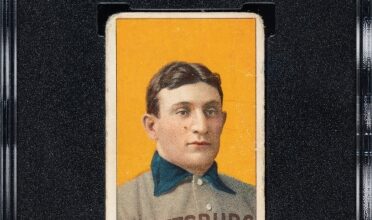Career Chronicling Reggie Jackson Baseball Cards, Hottest Auctions

Reggie Jackson wore No. 44 when he played for the New York Yankees. And on Oct. 18, 1977 — 44 years ago — the Hall of Fame slugger became Mr. October.
Jackson had hit a home run in Game 5 of the 1977 World Series in his final at-bat, a drive that clanged off the right-field foul pole at Dodger Stadium. New York lost 10-4 to the Los Angeles Dodgers, and the Series headed back to New York with the Yankees still leading the best-of-seven series 3-2.
If the Dodgers thought they had regained momentum heading into Game 6, Jackson scotched that idea in a hurry.
Reggie hit three home runs — all on the first pitch, off three different pitchers— as the Yankees won 8-4 to capture their first World Series title since 1962.
Jackson’s last drive, a monstrous 450-foot shot into the center-field bleachers off knuckleball pitcher Charlie Hough, sent the Yankee Stadium crowd of 56,407 into a frenzy. Jim Murray, the legendary Los Angeles Times columnist, described the homer as a “booming Jack Nicklaus-type tee shot, high and far, the kind that pitchers wake up screaming in the middle of the night over.”
Throw in the home run from Game 5, and Reggie had four home runs on four consecutive swings.
Mickey Mantle and Willie Mays were two of the most coveted baseball card subjects of the 1960s. Jackson arguably holds that mantle (no pun intended) for the 1970s, although some collectors can make the case for Nolan Ryan. However, Reggie was always in the conversation. A collector himself, it was a fact he certainly would enjoy.
To recognize Reggie — it’s hard to believe he’s 75 years old now — here is a look at some of his more notable cards. We’ll go with nine, to honor Jackson’s number when he played with the Athletics, the team he began and ended his major league career with. There is a heavy emphasis on the 1970s, but that is when Jackson was dominant.
1969 Topps No. 260
It makes sense that Jackson’s first Topps card would top this list. Jackson began with the Athletics when they were still in Kansas City, but he began to blossom when the team moved to Oakland and really began to shine in 1969 with 47 home runs. This is one of the key cards of the 1969 Topps set, and certainly the most coveted rookie card. Other than the Mickey Mantle base card, which is the final Topps regular-season product of the Yankees’ great, Reggie’s rookie is a much sought-after card in the set.
More than 8,000 Jackson rookies have been sent to PSA for grading, and cards in the highest grade are at a premium. There is only one gem mint card and 41 that have been rated Mint 9. Prices for respectable examples start at around $150 and go up.
1970 Topps No. 140

Reggie’s second Topps base card issue is easier to obtain than his rookie card, and it smacks of typical poses that Topps photographers used 50 years ago. Taken at Yankee Stadium — since at the time, Topps photographed almost every player when they came through New York — this card shows a young, determined Reggie squaring up with his eyes on the ball. Considering Jackson’s reputation as a free swinger, it’s almost an incongruous pose. Especially when one realizes that Jackson led the league in strikeouts from 1968 through 1971 with staggering whiff totals of 171, 142, 135 and 161.
You’ll pay $75 and up for a nicer one.
1978 Topps No. 200

This card shows Jackson in the classic follow-through swing that became his trademark. Coming on the heels of Reggie’s three homer performance the previous October, and with a nifty medallion of red, white and blue in the top right-hand corner to indicate his All-Star status, this was a card to enjoy in the summer of 1978.
Sure, there are other key cards in the ’78 set, including rookie cards of Eddie Murray and Paul Molitor and Nolan Ryan, but the Reggie card shows Mr. October at the zenith of his slugging skills. You can still own a nice one for a modest price.
1971 Topps No. 20
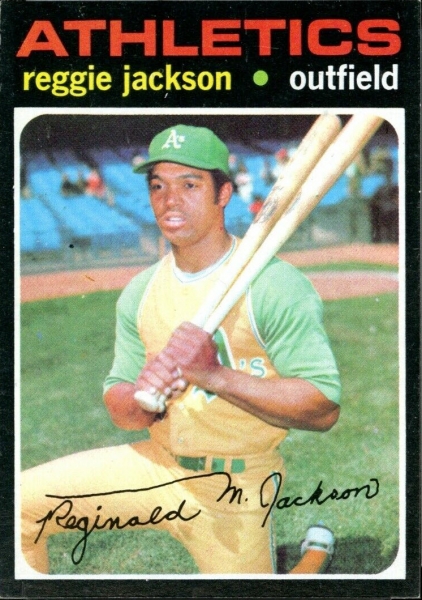
Current-day major leaguers should take note of Jackson’s carefully composed facsimile autograph on the 1971 Topps set. There is quite a flourish to the “M” in Reggie’s middle name, and he uses his full first name of “Reginald,” rather than the more familiar “Reggie” in latter-day autographs. That alone should make the card a favorite. But having a nicely centered, dinged-free cornered card on this black-bordered set is more of a treat. Condition-wise, the 1971 Topps set is a challenge because the corners chip so easily.
As if to prove the point, of the nearly 2,300 1971 Topps cards of Jackson submitted to PSA, there are no gem mints and only 11 with PSA 9 grades. If you’re OK with something more pedestrian, they’re plentiful and not expensive.
1970 Kellogg’s No. 32
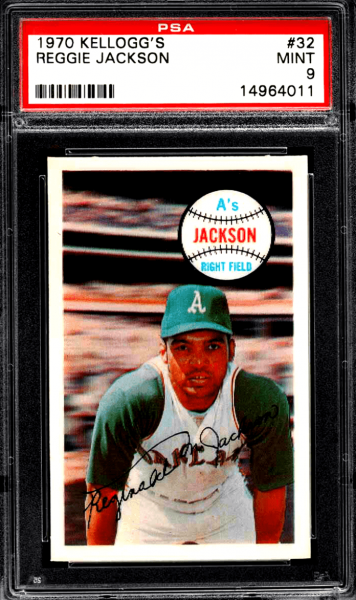
Jackson’s facsimile signature is similar to the one found on the 1971 Topps card, although the autograph on the 1970 Kellogg’s card appears to be a little more crowded. That could be because the 3-D Kellogg’s cards are slightly narrower than Topps’ version. Kellogg’s cards were 2¼ inches wide, while Topps cards were 2½ inches across. Kellogg’s put cards in boxes of cereal, although there was a mail-in option for complete sets. Like many Kellogg’s sets, the 1970 cards had a tendency to crack or curl (or do both) because of the lenticular printing process.
Still, of the 838 Jackson cards submitted to PSA, 77 are gem mint and more than half (468) have a PSA 9 grade. Other than those high end examples, most can be found for $50 or less.
1974 Topps No. 130

This card comes after Jackson’s only MVP season, when he hit a league-leading 32 homers and 117 RBI. The 1974 Topps card shows Jackson in action, following through on a swing. Topps feeding off Jackson’s ’73 heroics, featured him on six different cards for the 1974 set. The base card is there, along with Reggie featured on an All-Star right fielders card with Billy Williams, two league leaders cards (homers and RBI) and two postseason cards (the AL playoffs card and Game 6 of the World Series). Make it seven if you want to include the A’s team card. The base card is easy to find and except for high grade copies, remains very affordable.
1977 Topps No. 10
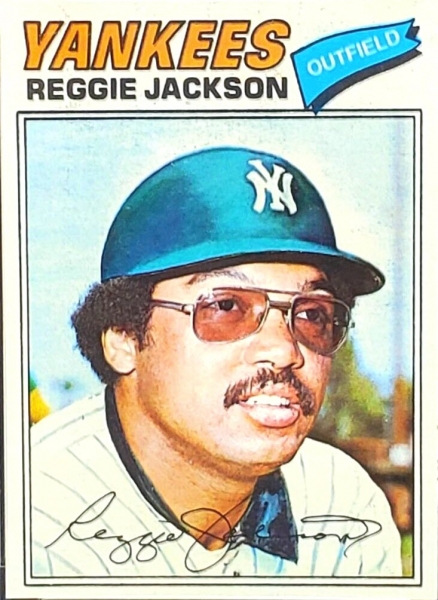
This card represents the Reggie that baseball fans would come to know (or despise). Featured as a Yankee for the first time, there is nothing truly special about Jackson’s photograph in the 1977 set. It’s a glorified mug shot with an airbrushed helmet and jersey, but it is the season Jackson helped the Yankees return to the World Series and win their first championship in 15 seasons. Nice, ungraded copies can still be had for under $25…and there’s a Burger King version with a better photograph.
What is intriguing about the 1977 Topps Reggie Jackson is the card that did not make the set. A proof from the ’77 set shows a smiling Jackson in a Baltimore Orioles uniform, although the banner for the card lists the Yankees as his team.
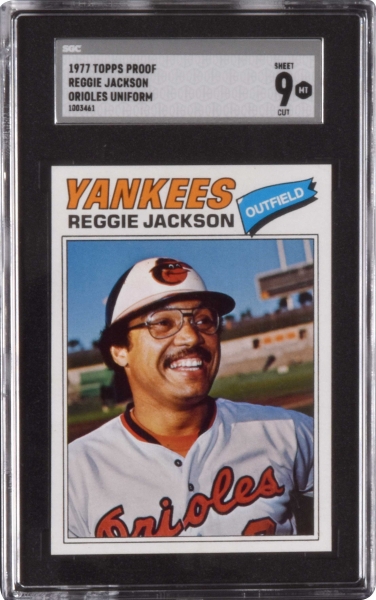
Reggie played in Baltimore in 1976 and had a respectable season with 27 homers and 91 RBI. But it was clear that he was the prize of free agency heading into 1977, and the Yankees won the contest. The Jackson proof was “found” by Topps in May 2004 when the company opened its vault of archival material.
1973 Topps No. 255
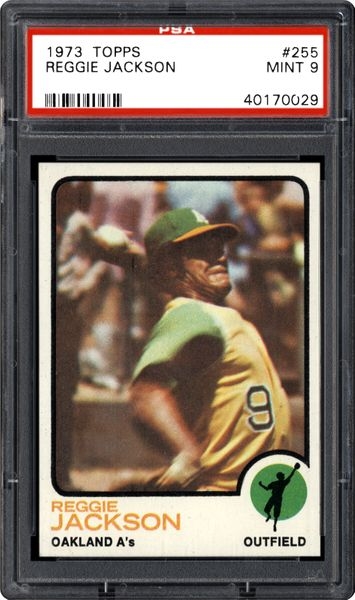
Many cards of Reggie either feature headshots or action shots of the slugger at bat. The 1973 Topps set deviated from that pattern. A not-too-sharp photograph of Jackson shows him grimacing as he makes a throw. It almost looks as if Reggie is badly launching a shot put during a track meet.
About 2,400 of these cards have been sent to PSA for grading, and there are no 10s. The highest grade is PSA 9 and there are 99 at that level. While those can get pricey, most ’73 Reggies fall into the low cost category.
1990 Upper Deck Baseball Heroes Autograph
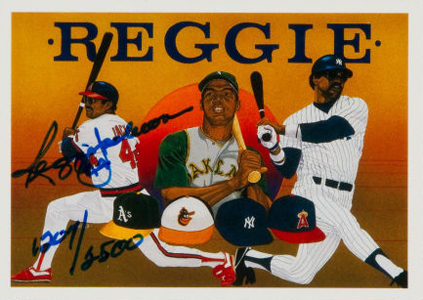
This card, issued as part of a set that helped kick off the “autographs in packs” idea that became a hobby staple, has 2,500 signed copies and was part of Upper Deck’s inaugural “Heroes” insert line.
While it was tough to pull at the time, that’s because it was part of one of a set with one of the largest production runs ever, one that served as the company’s follow-up to its groundbreaking 1989 offering. Today, they typically sell for several hundred dollars.
Here’s a look at the 44 ‘most watched’ Reggie Jackson baseball cards on eBay right now:


